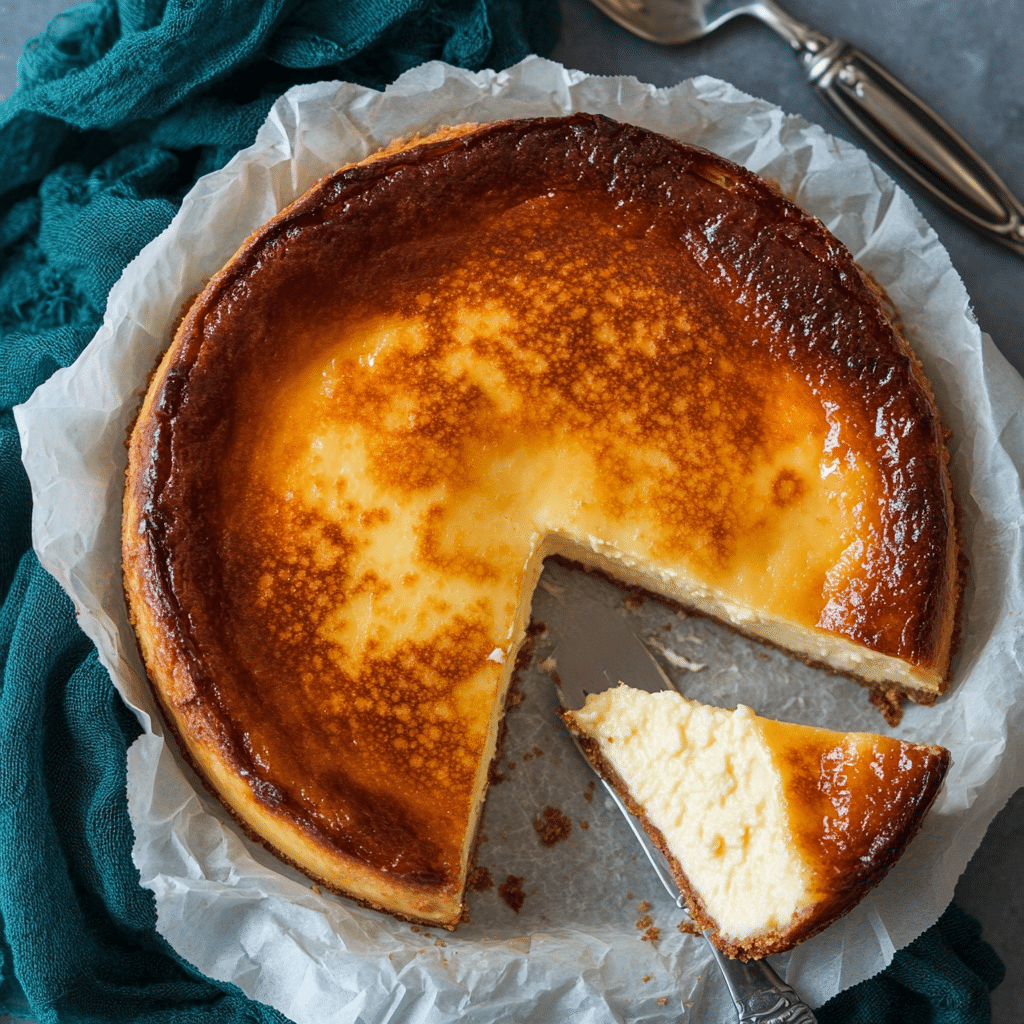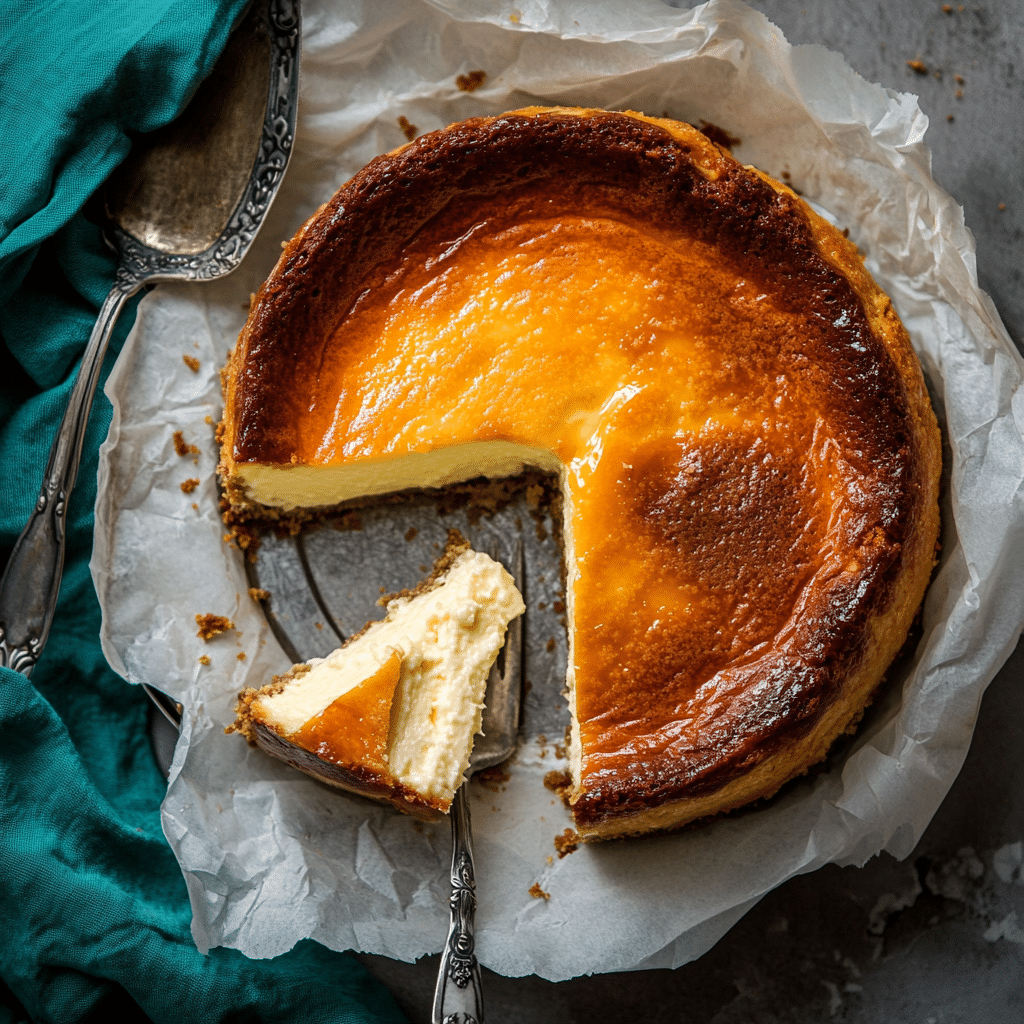Why You’ll Love This Recipe
San Sebastian Cheesecake, also known as Basque Burnt Cheesecake, is a rich, creamy dessert with a caramelized top and a custard-like center. Originating from the Basque region of Spain, this crustless cheesecake is known for its rustic, burnt appearance and deep flavor. It’s incredibly simple to make, using minimal ingredients, and delivers maximum indulgence with every bite.
ingredients
(Tip: You’ll find the full list of ingredients and measurements in the recipe card below.)
cream cheesegranulated sugarsaltlarge eggsheavy creamall-purpose flourvanilla extract
directions
Preheat your oven to 400°F (200°C) and line a springform pan with parchment paper, allowing the paper to overhang the edges.
In a large mixing bowl, beat the cream cheese and sugar until smooth and fluffy.
Add the eggs one at a time, mixing well after each addition.
Pour in the heavy cream and vanilla extract, blending until fully incorporated.
Sift in the flour and mix just until smooth and no lumps remain.
Pour the batter into the prepared pan.
Bake for 50-60 minutes, or until the top is deeply golden brown and the center is still slightly jiggly.
Allow the cheesecake to cool in the pan to room temperature, then refrigerate for several hours or overnight before serving.
Servings and timing
This recipe yields approximately 8 servings.Preparation time: 15 minutesBaking time: 50-60 minutesCooling and chilling time: 4-6 hoursTotal time: 5-7 hours
Variations
Add a splash of espresso for a mocha twist.
Mix in citrus zest for a brighter flavor.
Use brown sugar instead of white for a deeper caramel tone.
Infuse with liqueur like Grand Marnier or Amaretto for a special occasion.
storage/reheating
Store San Sebastian Cheesecake in the refrigerator, tightly covered, for up to 5 days.Freezing is also an option—wrap slices individually and freeze for up to 2 months.To serve, thaw in the refrigerator overnight. Do not microwave to reheat; serve chilled or at room temperature.

FAQs
What makes San Sebastian Cheesecake different from regular cheesecake?
It’s crustless, baked at a high temperature for a caramelized top, and has a softer, creamier center.
Why does it look burnt?
The high heat intentionally burns the top layer, giving it a signature color and deep flavor.
Can I reduce the sugar?
Yes, but altering the sugar may slightly change the texture and caramelization.
Is it supposed to jiggle in the center?
Yes, the center should remain slightly jiggly even after baking—it sets as it cools.
Can I make it without flour?
Yes, for a gluten-free version, substitute with cornstarch or omit entirely for a denser texture.
Do I need a springform pan?
A springform pan is ideal, but any deep round cake pan with high parchment lining will work.
Why is my cheesecake cracked?
Cracks are less noticeable in this style due to the burnt top, but overbaking or sudden temperature changes can cause them.
Can I add toppings?
Traditionally served plain, but fresh fruit, whipped cream, or a drizzle of caramel can complement it well.
How long should I chill it?
Chill at least 4 hours, but overnight gives the best texture.
Can I double the recipe?
Yes, adjust baking time accordingly and use a larger pan.
Conclusion
San Sebastian Cheesecake is a show-stopping dessert that proves simple ingredients can create extraordinary results. Its unique appearance and melt-in-your-mouth texture make it a favorite for both casual gatherings and elegant dinners. Once you try it, you’ll understand why it’s taken the dessert world by storm.
Print
San Sebastian Cheesecake
- Prep Time: 20 minutes
- Cook Time: 60 minutes
- Total Time: 1 hour 20 minutes
- Yield: 10 servings 1x
- Category: Dessert
- Method: Baking
- Cuisine: Spanish
- Diet: Vegetarian
Description
San Sebastian Cheesecake, also known as Basque Burnt Cheesecake, is a rich and creamy dessert with a caramelized top and a soft, custard-like center.
Ingredients
- 2.2 lbs (1 kg) cream cheese, at room temperature
- 1 1/2 cups (300 g) granulated sugar
- 6 large eggs
- 2 cups (480 ml) heavy cream
- 1/4 cup (30 g) all-purpose flour
- 1/2 tsp salt
- 1 tsp vanilla extract
Instructions
- Preheat the oven to 400°F (200°C). Line a 9-inch (23 cm) springform pan with parchment paper, allowing the paper to extend above the rim.
- In a large bowl, beat the cream cheese and sugar until smooth and creamy.
- Add the eggs one at a time, beating well after each addition.
- Stir in the vanilla extract and salt.
- Add the heavy cream and mix until fully incorporated.
- Sift in the flour and mix until the batter is smooth and lump-free.
- Pour the batter into the prepared pan.
- Bake for 50–60 minutes or until the top is deeply golden and the center is still slightly jiggly.
- Let the cheesecake cool to room temperature, then refrigerate for several hours or overnight before serving.
Notes
- The cheesecake will puff up while baking and deflate as it cools — this is normal.
- Use high-quality cream cheese for the best flavor and texture.
- You can serve it slightly warm or chilled, based on your preference.
Nutrition
- Serving Size: 1 slice
- Calories: 420
- Sugar: 18g
- Sodium: 240mg
- Fat: 34g
- Saturated Fat: 20g
- Unsaturated Fat: 12g
- Trans Fat: 1g
- Carbohydrates: 22g
- Fiber: 0g
- Protein: 8g
- Cholesterol: 160mg


Your email address will not be published. Required fields are marked *